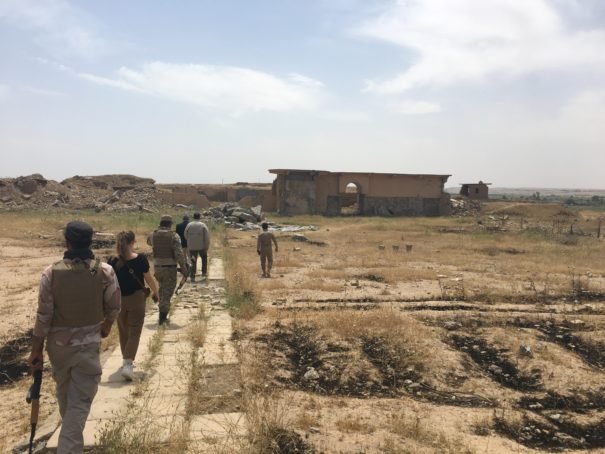
Sitting Outside of Mosul, Waiting for the Sugar to Settle

Sitting Outside of Mosul, Waiting for the Sugar to Settle
Tea in the Nineveh Plains
The men stir their tea. They speak, stare, and listen. Then, they stir some more.
Some strangers—now fellow-travelers and, indeed, friends—and I have been traipsing around the Nineveh Plains all day. We’re on our way to Mosul. The Western journalists among us are covering the final act in the war to liberate the city, but I’m just here to understand how certain minority factions are positioning themselves for the politics of peace.
The exhilaration of the first few hours have faded, and I’m bored again. “Research” gets repetitive. Race down a road, wait at a checkpoint, sit in a circle, stir the tea, and listen to men with guns. Race up another road, wait at a checkpoint, sit in a square, stir the tea, and listen to more men with guns plot the future—without moving past the past.
I want to drink the tea. But I let it sit there, on a rickety table. They’ve brewed a pot of loose Assam tea: black tea, boiling water, a stick of cinnamon—but no mint, sadly. These folks have heaped mounds of sugar into tiny glasses, and now they’re stirring and stirring, but not sipping. I wonder briefly if the tea is poisoned.
Perhaps Louis, an Iraqi Christian with a soft spot for Saddam and the old Ba‘ath regime, will take the first sip. But he keeps stirring—and speaking.
“Baghdad can guarantee autonomy,” he tells the militiamen gathered in a tin tent outside a village that was home to tens of thousands of Assyrian Christians, before ISIS took over. Various forces—a U.S.-led coalition, the Iraqi national army, Peshmerga, and the innocuously named “popular mobilization units”—cleared the area in October 2016. But folks have been slow to return. “You need to behave carefully over the next few months. Only Baghdad can give you what you want.”
Others aren’t so sure. “Jonathan,” a militiaman from the Shabak community, grimaces and confers quietly with a visiting lawmaker. A commander holds court. Meanwhile, a pair of prim UN staffers, with their pressed khakis and bleached shirts, take notes.
Across the tent, two Assyrians talk. I don’t speak Neo-Aramaic, but can tell they’re chatting about me: “Anthony,” “Lebanese-American,” “researcher,” and—to summarize—“what the fuck is he doing here?” A friend, who’s ushered me around Nineveh and Mosul, whispers: “Maronay”—meaning, Maronite, a largely Lebanese Christian sect. Surprisingly, the designation opens a door. The man smiles and asks me which of the rival Lebanese warlords I prefer.
I demur. He asks about the Mountain War of 1983. We’re outside of Mosul, where the man’s compatriots are fighting for their future, but he’s grilling me about Lebanon’s past.
“Don’t you have enough to worry about here?” I bite back, with a smile. He laughs.
I finally take a sip of my tea. Now I understand why no one is drinking it. This tea is as sweet as syrup. I add water, stir, and try again. I stir, clumsily, for an eternity. “You should let the sugar settle,” whispers a friend, “if you actually want to drink it.”
Too late. The commander’s watching. I keep stirring and begin to speak. “This is delicious, thank you.”